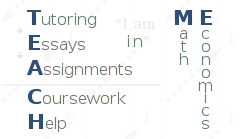Section 7: Problem 4 Solution
Working problems is a crucial part of learning mathematics. No one can learn topology merely by poring over the definitions, theorems, and examples that are worked out in the text. One must work part of it out for oneself. To provide that opportunity is the purpose of the exercises.
James R. Munkres
(a) A real number
is said to be algebraic (over the rationals) if it satisfies some polynomial equation of positive degree
with rational coefficients
. Assuming that each polynomial equation has only finitely many roots, show that the set of algebraic numbers is countable.
(b) A real number is said to be transcendental if it is not algebraic. Assuming the reals are uncountable, show that the transcendental numbers are uncountable. (It is a somewhat surprising fact that only two transcendental numbers are familiar to us:
and
. Even proving these two numbers transcendental is highly nontrivial.)
(a) Let
be an algebraic number of degree
if it is a root of a polynomial of degree
with rational coefficients. Then, the set of all algebraic numbers is the countable union of the sets of algebraic numbers of a finite degree, and if we show that the latter sets are all countable, we are done. Now let us map the set of all algebraic numbers of degree
to the set
by
, where
is the
th root of the polynomial
(we pick any such polynomial for
, and we know that for each such polynomial there are only finite number of roots, so we order different roots of the polynomial, and determine
for
).
is clearly injective, and since
is countable, we have a composite of two injections being an injective correspondence from the set of all algebraic numbers of degree
to
. Note, that, in fact, the set of all algebraic numbers is countably infinite, as it contains
, being algebraic numbers of degree
.
Of course, we could have avoided considering each set of algebraic numbers of a particular degree by constructing
the same way for the whole set of algebraic numbers, but then, as the range of
we would have the set of all infinite sequences of rational numbers that are eventually zero (such sequences have all zeros starting from some coordinate), which is also countable, but this fact has not been proved yet, so we would have to prove it anyway (see also Exercise 5).
(b) If it were countable, then the set of the real numbers would be countable as the union of the countable sets of algebraic and transcendental numbers.
